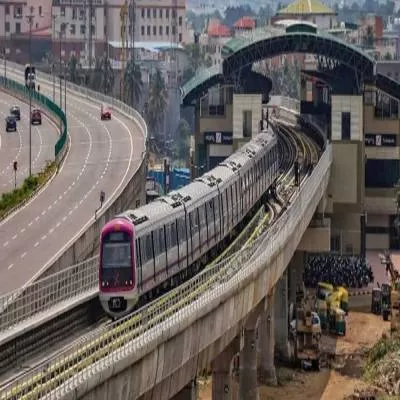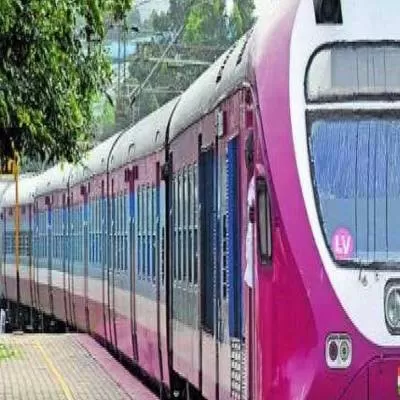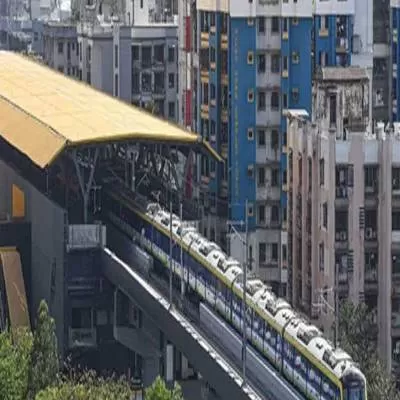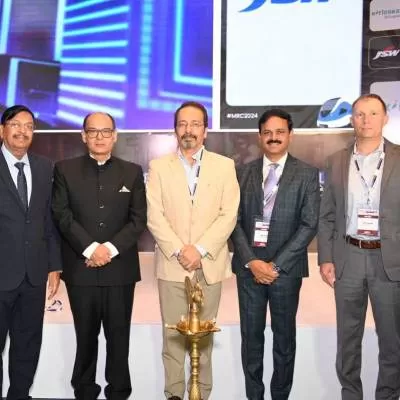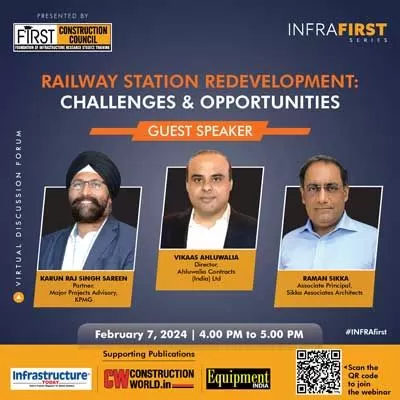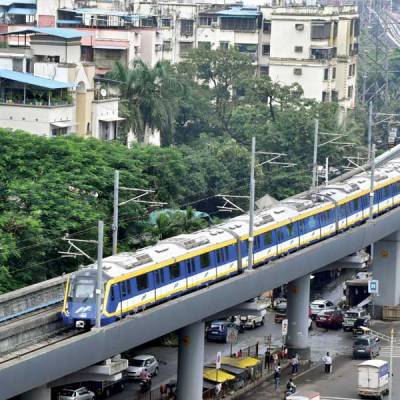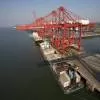- Home
- Infrastructure Transport
- RAILWAYS & METRO RAIL
- Metros need money

Metros need money
Report card
Sunil Srivastava, Managing Director, BARSYL, wonders, ¨How does one implement a project worth Rs 6,000 crore where he has not tied up for even half of it?¨ He goes on, ¨These projects only have the initial equity of Rs 100 crore or Rs 200 crore, which is contributed by the state or Central Government.¨ So an average of Rs 200 crore is required to be spent on the project every month for the next 30 months, to total up to Rs 6,000 crore. Otherwise a three-year project will drive on for eight years.
Acknowledging that the Government has encouraged several projects, Suparna Chattopadhyay, Head-Capex, CMIE, says, ¨While the Chennai and Hyderabad Metros are up for completion, the only problem is the long duration of time taken for projects.¨
Contractors´ zone
Meanwhile, contractors for Metro projects are busy. ¨We are involved in the development of Metro projects in Delhi, Kolkata, Noida, etc,¨ shares S Ramnath, CFO, ITD Cementation India. ¨Having completed the Delhi Metro, we have done two projects for Jaipur Metro, the Mangalore projects are almost completed, and we are laying tracks for the Bengaluru Metro.¨
Jagdishkumar Gupta, Chairman & Managing Director, J Kumar Infraprojects, informs us that the company has bagged the Ahmedabad Metro project, which is around Rs 3,000 crore. Despite a few clearance-related issues, especially for land, work has already started on the project. Gupta shares his company´s strategy and approach towards project execution: ¨When we bag a project, rather than wait for the entire land to be in place, we start construction in full swing on the available land. Work has to go on.¨
And VB Gadgil, Chief Executive & Managing Director, L&T Metro Rail (Hyderabad) Ltd, tells us: ¨As for the Hyderabad Metro, we are almost done with the first stage - including testing of trains and other things - and stage two, which is another 10-12 km, should be completed by around October.¨
The challenges
While acquiring land can be one big issue in Metro projects, funding is another major challenge. Srivastava elaborates, ¨As state governments do not have the financial capacity to fund these projects, they need to look at multilateral funding. While JICA, which is too exposed in the transport sector in India, is curtailing its exposure, the World Bank has not looked at Metros in India at all. So then you start looking at European banks or maybe some German bank in development funds. But they are not confident about putting money here.¨ Such is the scenario.
There are about 10-odd Metro projects in the country, updates RS Ramasubramaniam, Co-Chairman, Feedback Infra Pvt Ltd, agreeing that finance is the main bugbear. ¨When the Modi Government had come to power, there was talk about getting Rs 100,000 crore from Japanese investment,¨ he says. ¨It has been one year and we have not seen enough attraction on multinational or bilateral debt put together for these investments. I have not heard of any concrete proposal for taking forward the funding issue.¨
Again, there are challenges of limited resources in terms of same construction companies and contractors everywhere. If the same contractor takes up five different projects, he would not have the capacity to do justice to all of them. The challenge, here, will also involve managing resources like manpower and construction. In Srivastava´s opinion, ¨Compared to underground construction, elevated developments are easier because right of way is available and construction cost is lower. Whereas if it´s underground, you start digging and there are interruptions. So uncertainty is a big issue and underground construction cost is three times more than elevated.¨
While, for Gadgil, the Metro rail sector is picking up now, these are mostly government-sponsored projects, apart from the Mumbai Metro, Delhi Airport Expressway and the Hyderabad Metro. Thus, while Metro projects are happening, the pace of implementation, depending on location, is different. Also, at the policy level, he says, ¨The Metro initially started with the Tramways Act. Then, around two years ago, the government introduced the Metro Act without fully understanding the complexities of the elements. Now, the problem is that interpretation of the changes is creating hurdles as the projects were being executed with some assumptions and, unlike the Tramways Act, the Metro Act is a Central Act. Also, the two Acts cannot exist together. So this was a challenge for projects under execution.¨ Further, while there are no challenges involved in sourcing equipment, technology and materials, unavailability of adequate skilled labour is a major challenge.
METRO: CW´S RECOMMENDATIONS
- While the new government is keen on Metro projects, local authorities and contractors need to be clear about design and timely implementation.
- We need a robust study in place with a realistic cost rather than a mere template.
- The courts should give the liberty to set tariffs. Thus, if a project is financially unviable, the gap can be decreased.
- Examine transit-oriented development to bring in other revenues. This will reflect in the overall project finances and finance report, and lenders will feel the project is still viable.
- It is important to plan the finances right for Metro projects. Long-term financing should be made available.
- A shift in attitudinal changes, especially at the bureaucracy and government level, is required. As in the case of PPP, they deal with such projects like any other normal contract: ´I am a giver, you are a taker.´ This needs to change.
- In the case of Metro projects, time is money. So, focused and critical monitoring of these projects at the highest level is required.
- Metros are normally executed in existing cities. Thus, there will be issues related to environment clearance and land acquisition. So, here, project preparedness needs to be done thoroughly.
- Cliche
- Metro Rail
- Metro Projects
- Ahmedabad
- Vijayawada
- Nagpur
- Kochi
- Sunil Srivastava
- BARSYL
- Central Government
- Suparna Chattopadhyay
- CMIE
- S Ramnath
- ITD Cementation India
- Mangalore Projects
- Jagdishkumar Gupta
- J Kumar Infraprojects
- VB Gadgil
- L&T Metro Rail (Hyderabad) Ltd
- JICA
- RS Ramasubramaniam
- Feedback Infra Pvt Ltd
- Construction
- Airport
- CW
- PPP
All that glitters is not gold. A cliché perhaps, but appropriate for India´s Metro rail sector at present. While the industry celebrates announcements of metro projects in Ahmedabad, Vijayawada, Nagpur, Kochi, and so on, none of these potentially big opportunities have tied up their finance. Report card Sunil Srivastava, Managing Director, BARSYL, wonders, ¨How does one implement a project worth Rs 6,000 crore where he has not tied up for even half of it?¨ He goes on, ¨These projects only have the initial equity of Rs 100 crore or Rs 200 crore, which is contributed by the state or Central Government.¨ So an average of Rs 200 crore is required to be spent on the project every month for the next 30 months, to total up to Rs 6,000 crore. Otherwise a three-year project will drive on for eight years. Acknowledging that the Government has encouraged several projects, Suparna Chattopadhyay, Head-Capex, CMIE, says, ¨While the Chennai and Hyderabad Metros are up for completion, the only problem is the long duration of time taken for projects.¨ Contractors´ zone Meanwhile, contractors for Metro projects are busy. ¨We are involved in the development of Metro projects in Delhi, Kolkata, Noida, etc,¨ shares S Ramnath, CFO, ITD Cementation India. ¨Having completed the Delhi Metro, we have done two projects for Jaipur Metro, the Mangalore projects are almost completed, and we are laying tracks for the Bengaluru Metro.¨ Jagdishkumar Gupta, Chairman & Managing Director, J Kumar Infraprojects, informs us that the company has bagged the Ahmedabad Metro project, which is around Rs 3,000 crore. Despite a few clearance-related issues, especially for land, work has already started on the project. Gupta shares his company´s strategy and approach towards project execution: ¨When we bag a project, rather than wait for the entire land to be in place, we start construction in full swing on the available land. Work has to go on.¨ And VB Gadgil, Chief Executive & Managing Director, L&T Metro Rail (Hyderabad) Ltd, tells us: ¨As for the Hyderabad Metro, we are almost done with the first stage - including testing of trains and other things - and stage two, which is another 10-12 km, should be completed by around October.¨ The challenges While acquiring land can be one big issue in Metro projects, funding is another major challenge. Srivastava elaborates, ¨As state governments do not have the financial capacity to fund these projects, they need to look at multilateral funding. While JICA, which is too exposed in the transport sector in India, is curtailing its exposure, the World Bank has not looked at Metros in India at all. So then you start looking at European banks or maybe some German bank in development funds. But they are not confident about putting money here.¨ Such is the scenario. There are about 10-odd Metro projects in the country, updates RS Ramasubramaniam, Co-Chairman, Feedback Infra Pvt Ltd, agreeing that finance is the main bugbear. ¨When the Modi Government had come to power, there was talk about getting Rs 100,000 crore from Japanese investment,¨ he says. ¨It has been one year and we have not seen enough attraction on multinational or bilateral debt put together for these investments. I have not heard of any concrete proposal for taking forward the funding issue.¨ Again, there are challenges of limited resources in terms of same construction companies and contractors everywhere. If the same contractor takes up five different projects, he would not have the capacity to do justice to all of them. The challenge, here, will also involve managing resources like manpower and construction. In Srivastava´s opinion, ¨Compared to underground construction, elevated developments are easier because right of way is available and construction cost is lower. Whereas if it´s underground, you start digging and there are interruptions. So uncertainty is a big issue and underground construction cost is three times more than elevated.¨ While, for Gadgil, the Metro rail sector is picking up now, these are mostly government-sponsored projects, apart from the Mumbai Metro, Delhi Airport Expressway and the Hyderabad Metro. Thus, while Metro projects are happening, the pace of implementation, depending on location, is different. Also, at the policy level, he says, ¨The Metro initially started with the Tramways Act. Then, around two years ago, the government introduced the Metro Act without fully understanding the complexities of the elements. Now, the problem is that interpretation of the changes is creating hurdles as the projects were being executed with some assumptions and, unlike the Tramways Act, the Metro Act is a Central Act. Also, the two Acts cannot exist together. So this was a challenge for projects under execution.¨ Further, while there are no challenges involved in sourcing equipment, technology and materials, unavailability of adequate skilled labour is a major challenge. METRO: CW´S RECOMMENDATIONS While the new government is keen on Metro projects, local authorities and contractors need to be clear about design and timely implementation. We need a robust study in place with a realistic cost rather than a mere template. The courts should give the liberty to set tariffs. Thus, if a project is financially unviable, the gap can be decreased. Examine transit-oriented development to bring in other revenues. This will reflect in the overall project finances and finance report, and lenders will feel the project is still viable. It is important to plan the finances right for Metro projects. Long-term financing should be made available. A shift in attitudinal changes, especially at the bureaucracy and government level, is required. As in the case of PPP, they deal with such projects like any other normal contract: ´I am a giver, you are a taker.´ This needs to change. In the case of Metro projects, time is money. So, focused and critical monitoring of these projects at the highest level is required. Metros are normally executed in existing cities. Thus, there will be issues related to environment clearance and land acquisition. So, here, project preparedness needs to be done thoroughly.


